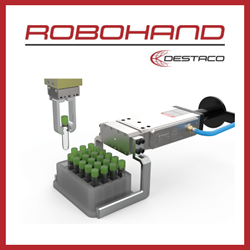A Few Good Researchers: Revamped YFA Extends Mentorship & Increases Funding
Up to $1 million available for elite young researchers
DARPA wants to ensure that young scientists with novel ideas that may advance U.S. national security receive the funding and mentorship needed to investigate them.
As the DARPA Young Faculty Award (YFA) program enters its seventh year, changes in scope mean that 2013 recipients can expect higher levels of funding for a potentially longer duration in a program that has been reworked to involve even more direct interaction with DARPA program managers. As usual, DARPA seeks researchers from U.S. institutions of higher learning within five years of appointment to a tenure-track position. For the first time, however, researchers with equivalent experience at nonprofit research institutions are now also welcome to apply. Researchers selected for grants will receive up to $500,000 in funding for a 24-month base period, with the potential for another $500,000 as part of a DARPA Director's Fellowship.
"DARPA has increased funding for the program this year with the requirement that applicants list all other funding sources," explained Alicia Jackson, DARPA program manager for the 2013 YFA. "We want researchers who are more focused on future DoD and national security needs, and who can work in closer partnership with DARPA program managers. We opened the program to proposals from junior researchers at nonprofits to ensure we get the top talent and proposals that best match the 13 topic areas of direct interest to DARPA."
This year's technical topic areas have a narrower focus than in previous years and are closely tied to work currently underway or ramping up in the Microsystems Technology Office and Defense Sciences Office. As a result, YFA recipients will receive close mentorship and interaction with DARPA program managers who are deeply invested in the outcomes of the research projects.
"We hope that recipients will leave the program with a better understanding of defense science and technology challenges and requirements," said Jackson. "Developing relationships with DARPA and the DoD is one of the big benefits of the program, but site visits to see various military technologies, and learn firsthand from those who use them, will also give YFA recipients unique insight into national security needs. Our hope is that these experiences guide participants' future research."
At the end of the 24-month performance period, up to four standout YFA recipients will be selected to continue on as DARPA Director's Fellows. These Fellows will receive up to $500,000 in additional funding over one year to further advance their research towards achieving breakthrough DoD capabilities.
Also new this year, proposals in response to the YFA solicitation will be evaluated against a set of considerations known as the Heilmeier Catechism. George H. Heilmeier, a former DARPA Director, crafted the questions to help standardize evaluation of proposed research programs. YFA proposals must answer the following questions:
*What are you trying to do? Articulate your objectives using absolutely no jargon.
*How is it done today, and what are the limits of current practice?
*What's new in your approach and why do you think it will be successful?
*Who cares? If you're successful, what difference will it make?
*What are the risks and the payoffs?
*How much will it cost? How long will it take?
*What are the midterm and final "exams" to check for success?
Do you have what it takes to become a DARPA YFA researcher? For a full list of the technical topic areas, details and application instructions for the Young Faculty Awards, please view the full solicitation.
Featured Product

DESTACO - Revolutionizing Industrial Automation
Looking for a reliable solution to enhance your automation process? Look no further than the DESTACO Robohand Grippers. These grippers are designed for the modern world of robotics, offering unparalleled performance and precision. Whether you need to grip fragile items, irregularly shaped objects, or heavy-duty components, the DESTACO Robohand Grippers have got you covered. Their modular design allows for quick and easy customization, ensuring a perfect fit for your application.
